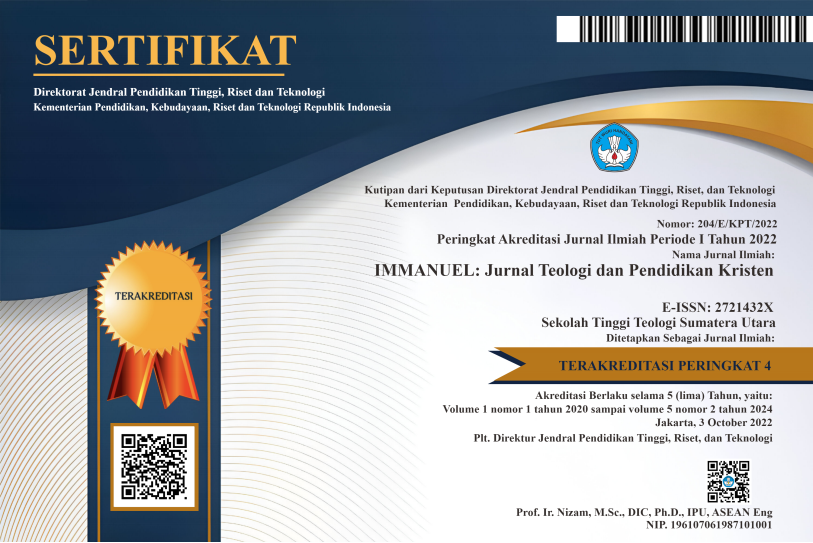Melampaui Eksegesis dan Eisegesis: Tinjauan Kritis terhadap Hermeneutika Teologi Pembebasan
Abstract
Liberation Theology as a movement and theological method has a unique hermeneutical approach. The way they study the Bible begins with studying their real life situations, then they identify the answers the Bible gives to their real problems. Interpreting the Bible starting from the context by some scholar was considered as an act of eisegesis, and not exegesis. Thus, this paper aims to review the hermeneutical approach used by Liberation Theology movement. This research is a qualitative research using descriptive-analytical method. Liberation Theology's hermeneutical approach is clearly outlined. Furthermore, the analysis of this approach is carried out by tracing its philosophical basis. In this way, one can judge the hermeneutics of Liberation Theology fairly and proportionally. The view being argued in this paper is that criticism of the hermeneutical approach of Liberation Theology is not properly positioned in the contradiction between exegesis and eisegesis, but it needs to be understood as beyond the contradiction. Although this approach starts its hermeneutic circle from context to text, that does not mean it cannot be justified. Pre-understanding before reading the text is raised clearly so that it can be spoken about with the intention of the text being read. It is in the process of dialoguing the context with the biblical text that the "meaning" is formed. The relationship between text and context is not understood as a linear one-way movement, but as an interconnected circle.
Abstrak
Teologi Pembebasan sebagai sebuah gerakan dan metode berteologi memiliki pendekatan hermeneutik yang unik. Cara mereka mempelajari Alkitab dimulai dengan mempelajari situasi nyata kehidupan mereka, lalu dengan itu, mereka mengidentifikasi jawaban-jawaban yang diberikan oleh Alkitab atas persoalan nyata mereka tersebut. Memaknai teks berangkat dari konteks oleh sebagian orang dianggap sebagai tindakan eisegesis, dan bukan eksegesis. Karena itu, tulisan ini bertujuan untuk meninjau pendekatan hermeneutik yang digunakan oleh gerakan Teologi Pembebasan. Penelitian ini merupakan penelitian kualitatif yang menggunakan metode deskriptif-analitis. Deskripsi garis besar pendekatan hermeneutik Teologi Pembebasan diuraikan secara jelas. Selanjutnya, analisis terhadap pendekatan tersebut dilakukan dengan cara merunut dasar filosofisnya. Dengan cara demikian, seseorang dapat menilai hermeneutika Teologi Pembebasan secara adil dan proporsional. Pandangan yang diajukan dalam tulisan ini adalah bahwa kritik terhadap pendekatan hermeneutika Teologi Pembebasan tidak tepat jika diposisikan dalam pertentangan antara eksegesis dan eisegesis, melainkan perlu dipahami sebagai yang melampaui pertentangan tersebut. Meskipun pendekatan ini memulai lingkaran hermeneutiknya dari konteks ke teks, bukan berarti tidak dapat dipertanggungjawabkan. Pra-paham sebelum membaca teks diangkat dengan terang untuk dapat dipercakapkan dengan intensi teks yang dibaca. Dalam proses mendialogkan konteks dengan teks Alkitab tersebutlah “makna” dibentuk. Hubungan antara teks dan konteks tidak dipahami sebagai gerakan satu arah yang linear, melainkan sebagai lingkaran yang saling terhubung.
Keywords
Full Text:
PDFReferences
Althaus-Reid, Marcella. “Liberation Theology.” In The Oxford Companion to Christian Thought, edited by Adrian Hastings, et al. Oxford: Oxford University Press, 2000.
Chalcraft, David J. Social-Scientific Old Testament Criticism. Shefield: Seffield Academic Press, 1997.
Escobar, Samuel. “Liberation Theologies and Hermeneutics.” In Dictionary for Theological Interpretation of the Bible, edited by Kevin J. Vanhoozer. Grand Rapids: Baker Book House Company, 2005.
Gutiérrez, Gustavo. A Theology of Liberation: History, Politic and Salvation. Maryknol: Orbis Book, 1973.
Hardiman, F. Budi. Seni Memahami: Hermeneutik Dari Schleiermacher Sampai Derida. Yogyakarta: PT Kanisius, 2015.
Mali, Mateus. “Gutiérrez Dan Teologi Pembebasan.” Orientasi Baru 25, no. 1 (2016): 19–36.
Milbank, John. “Liberation Theology Encyclopedia of Christian Theology.” In Encyclopedia of Christian Theology, edited by Jean-Yves Lacoste, 913. London: Routledge, 2005.
Natalie. “Evaluasi Kritis Terhadap Doktrin Gereja Dari Teologi Pembebasan.” VERITAS: Jurnal Teologi dan Pelayanan 1, no. 2 (2000).
Saidi, Acep Iwan. “Hermeneutika, Sebuah Cara Untuk Memahami Teks.” Jurnal Sosioteknologi 14, no. 7 (2008): 376–382.
Schmeller, T. “Liberation Theologies Dictionary of Biblical Interpretation.” In Dictionary of Biblical Interpretation, edited by John H Hayes, 66. Nashville: Abingdon Press, 1999.
Stuart, Douglas, and Gordon D. Fee. Hermeneutik: Menafsirkan Firman Tuhan Dengan Tepat. Malang: Gandum Mas, 2011.
Uchegbue, Christian O. “The Hermeneutics of Liberation Theology: A Critical Look At Its Christological, Harmatiological, Soteriological Dimentions.” LUMINA 22, no. 1 (2011): 1–17. https://ejournals.ph/article.php?id=7326.
Vegel, Zoltan. “Liberation Theology: A Critical Analysis.” Kairos – Evangelical Journal of Theology XII, no. 1 (2018): 81–91.
Wachid BS, Abdul. “Hermeneutika Sebagai Sistem Interpretasi: Paul Ricouer Dalam Memahami Teks-Teks Seni.” Imaji 4, no. 2 (2006): 198–209. https://journal.uny.ac.id/index.php/imaji/article/view/6712/5768.
DOI: https://doi.org/10.46305/im.v1i2.10
Refbacks
- There are currently no refbacks.
Copyright (c) 2020 IMMANUEL: Jurnal Teologi dan Pendidikan Kristen
Immanuel indexed by:
Immanuel: Jurnal Teologi dan Pendidikan Kristen
Published: Sekolah Tinggi Teologi Sumatera Utara
Website Institusi: stt-su.ac.id
Address: Jl. Sembada No. 32, Titi Rantai, Kec. Medan Baru, Kota Medan, Sumatera Utara 20131
ISSN: 2721-432X (online), 2721-6020 (print).
















